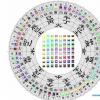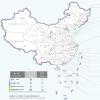仔细阅读:In agrarian(农业的) pre-industrial Europe 'you'
仔细阅读:In agrarian(农业的),pre-industrial Europe, "you"d want to wake up early, start working with the
Passage Two(2016年6月英语四级卷三真题及答案)
Question 52 to 56 are based on the following passage.
In agrarian(农业的),pre-industrial Europe, "you'd want to wake up early, start working with the sunrise, have a break to have the largest meal, and then you'd go back to work," says Ken Albala, a professor of history at the University of the Pacific, "Later, at 5 or 6, you'd have a smaller supper."
This comfortable cycle, in which the rhythms of the day helped shape the rhythms of the meals, gave rise to the custom of the large midday meal, eaten with the extended family, "Meal are the foundation of the family,' says Carole Couniban. a professor at Millersville University in
Peensylvania, "so there was a very important interconnection between eating together" and strength-eating family ties.
Since industrialization, maintaining such a slow cultural metabolism has been much harder. With the long midday meal shrinking to whatever could be stuffed into a lunch bucket or bought at a food stand. Certainly, there were benefits. Modern techniques for producing and shipping food led to greater variety and quantity, including a tremendous, increase in the amount of animal protein and dairy products available, making us more vigorous than our ancestors.
Yet plenty has been lost too, even in cultures that still live to eat. Take Italy. It's no secret that the Mediterranean diet is healthy, but it was also a joy to prepare and cat. Italians, says Counihan, traditionally began the day with a small meal. The big meal came at around 1 p.m. In between the midday meal and a late, smaller dinner came a small snack. Today, when time zones have less and less meaning, there is little tolerance for offices' closing for lunch, and worsening traffic in cities means workers can't make it home and back fast enough anyway. So the formerly small supper after sundown becomes the big meal of the day. the only one at which the family has a chance to get together. "The evening meal carries the full burden that used to be spread over two meals" says Counihan
52.What do we learn from the passage about people in pre-industrial Europe?
A.They had to work from early morning till late at night.
B.They were so busy working that they only ate simple meals.
C.Their daily routine followed the rhythm of the natural cycle.
D.Their life was much more comfortable than that of today.
53 What does Professor Carole Counihan say about. pre-industrial European families eating meals together?
A.It was helpful to maintaining a nation's tradition.
B.It brought family members closers to each other.
C.It was characteristic of the agrarian culture.
D.It enabled families to save a lot of money.
54.What does "cultural metabolism"(Line 1 ,Para. 3) refer to?
A.Evolutionary adaptation.
B.Changes in lifestyle.
C.Social progress.
D.Pace of life.
55.What does the author think of the food people eat today?
A.Its quality is usually guaranteed.
B.It is varied, abundant and nutritious.
C.It is more costly than what our ancestors ate.
D.Its production depends too much on technology.
56.What does the author say about Italians of the old days.
A.They enjoyed cooking as well as eating.
B.They ate a big dinner late in the evening.
C.They ate three meals regularly every day.
D.They were expert at cooking meals.
参考解答
52.【答案】A
【解析】,pre-industrial Europe, "you'd want to wake up early, start working with the sunrise, have a break to have the largest meal, and then you'd go back to work,"
53.【答案】B
【解析】"Meal are the foundation of the family,' says Carole Couniban. a professor at Millersville University in Peensylvania, "
54.【答案】D
【解析】With the long midday meal shrinking to whatever could be stuffed into a lunch bucket or bought at a food stand. Certainly, there were benefits.
55.【答案】B
【解析】Modern techniques for producing and shipping food led to greater variety and quantity, including a tremendous, increase in the amount of animal protein and dairy products available, making us more vigorous than our ancestors.
56.【答案】A
【解析】It's no secret that the Mediterranean diet is healthy, but it was also a joy to prepare and cat.
相似问题
选词填空:Contrary to popular belief older people gene
选词填空:Contrary to popular belief, older people generally do not want to live with their children Moreover, most adult ch
仔细阅读:Interactive television advertising which all
仔细阅读:Interactive television advertising, which allows viewers to use their remote controls to click onPassage One 2016年6月
段落匹配:Could Food Shortages Bring Down Civilization?
段落匹配:Could Food Shortages Bring Down Civilization? For many years I have studied global agriculturalSection B(2016年6月英语
仔细阅读:What can be done about mass unemployment? All
仔细阅读:What can be done about mass unemployment? All the wise heads agree: there’re no quick orPassage two 2016年6月英语六
长篇阅读:Reform and Medical Costs American are deeply
长篇阅读:Reform and Medical Costs American are deeply concerned about the relentless rise in healthSection B(2016年6月英语六级












